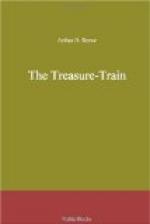“I thought Miss Hargrave was here,” he said, abruptly, looking about. “They told me over the wire she would be.”
“She should be here any moment,” returned Kennedy, looking at his watch and finding that considerably over an hour had elapsed since I had telephoned.
What it was I could not say, but there was a coldness toward Lewis that amounted to more than latent hostility. He tried to appear at ease, but it was a decided effort. There was no mistaking his relief when the tension was broken by the arrival of Madeline Hargrave.
The circumstances were so strange that none of them seemed to object while Kennedy began to explain, briefly, that, as nearly as he could determine, the illness of Mansfield might be due to something eaten at the supper. As he attached the bands about the necks and waists of one after another of the guests, bringing the little black cylinders thus close to the middle of their chests, he contrived to convey the impression that he would like to determine whether any one else had been affected in a lesser degree.
I watched most intently the two women who had just come in. One would certainly not have detected from their greeting and outward manner anything more than that they were well acquainted. But they were an interesting study, two quite opposite types. Madeline, with her baby-blue eyes, was of the type that craved admiration. Mina’s black eyes flashed now and then imperiously, as though she sought to compel what the other sought to win.
As for Fleming Lewis, I could not fail to notice that he was most attentive to Madeline, though he watched, furtively, but none the less keenly, every movement and word of Mina.
His preparations completed, Kennedy opened the package which had been left at the laboratory just before the hasty call from Miss Grey. As he did so he disclosed several specimens of a mushroom of pale-lemon color, with a center of deep orange, the top flecked with white bits. Underneath, the gills were white and the stem had a sort of veil about it. But what interested me most, and what I was looking for, was the remains of a sort of dirty, chocolate-colored cup at the base of the stem.
“I suppose there is scarcely any need of saying,” began Kennedy, “that the food which I suspect in this case is the mushrooms. Here I have some which I have fortunately been able to obtain merely to illustrate what I am going to say. This is the deadly Amanita muscaria, the fly-agaric.”
Madeline Hargrave seemed to be following him with a peculiar fascination.
“This Amanita,” resumed Kennedy, “has a long history, and I may say that few species are quite so interesting. Macerated in milk, it has been employed for centuries as a fly-poison, hence its name. Its deadly properties were known to the ancients, and it is justly celebrated because of its long and distinguished list of victims. Agrippina used it to poison the Emperor Claudius. Among others, the Czar Alexis of Russia died of eating it.




